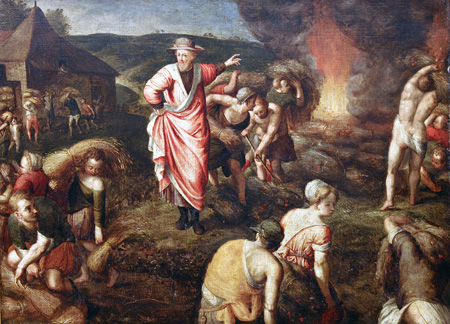A parable is a short allegorical tale from which the listener is expected to take a lesson. It is a literary form related to poetry, fables, wise sayings, and edifying and instructional literature in general, in that a parable seeks to impart helpful information under the guise of an interesting story. But while a parable is always allegorical, not every figurative story is the same. Many such stories use allegorical figures of speech merely to illustrate and explain. In those, everything is made clear up front so there can be no misunderstandings. Other parables can be quite murky, to encourage speculation and even misinformation and confusion.
What sets a parable completely apart from all other forms of storytelling, however, is its purpose. For a true parable is intended to conceal information as much as reveal it. A parable is actually a carefully coded communication intended to be understood only by certain parties and not by others. The surface story may be designed to amuse, fool, intrigue, or placate the uniformed listener — or maybe just delay their acting on it — while only those “in the know” realize what the tale is really about. But while parables can have fantastic elements like fables, they tend to be more grounded in reality.
Parables are exceedingly rare in the Old Testament, though more common in the later Talmud and Midrash. The Jewish Encyclopedia identifies only five in the entire Old Testament, and very few of those come anywhere near Jesus’ high storytelling standards. One such early example is found in the book of Judges. This “Parable of the Trees” is more like a fable, as it’s all about talking trees and the information is scarcely hidden.
In one of the gorier episodes of that bloody time, a man named Abimelech wanted to be king over Shechem. He persuaded his uncles to finance the slaughter of his seventy brothers, whom all died save for the youngest, Jotham, who hid. Before fleeing for his life, however, young Jotham addressed the men of Shechem:
When they told it to Jotham, he went and stood on the top of Mount Gerizim and lifted up his voice, cried out, and said to them, “Listen to me, you men of Shechem, that God may listen to you.he trees set out to anoint a king over themselves. They said to the olive tree, ‘Reign over us.’
“But the olive tree said to them, ‘Should I stop producing my oil, with which they honor God and man by me, and go to wave back and forth over the trees?’
“The trees said to the fig tree, ‘Come and reign over us.’
“But the fig tree said to them, ‘Should I leave my sweetness, and my good fruit, and go to wave back and forth over the trees?’
“The trees said to the vine, ‘Come and reign over us.’
“The vine said to them, ‘Should I leave my new wine, which cheers God and man, and go to wave back and forth over the trees?’
“Then all the trees said to the bramble, ‘Come and reign over us.’
“The bramble said to the trees, ‘If in truth you anoint me king over you, then come and take refuge in my shade; and if not, let fire come out of the bramble, and devour the cedars of Lebanon.’
“Now therefore, if you have dealt truly and righteously, in that you have made Abimelech king … then rejoice in Abimelech, and let him also rejoice in you; but if not, let fire come out from Abimelech and devour the men of Shechem and the house of Millo; and let fire come out from the men of Shechem and from the house of Millo and devour Abimelech.” [Judges 9:7-16,19-20]
Behind this talk of trees, basically Jotham was saying that his uncle Abimelech was no damn good, and if they thought otherwise, they also deserved destruction along with him. If this was meant as a curse or prophecy, it worked. Jotham fled, and Abimelech was slain three years later while burning down the town of Shechem and its trapped inhabitants.
Speaking truth to power
One parable that has the same literary power as those of the New Testament appears in the story of King David. At this point, the great king of Israel has crushed all his enemies and brought the Lord’s Ark to his new capital of Jerusalem, yet his wife despised him. This led David to commit a great sin. Spying Bathsheba at her bath, David summoned and impregnated her, later sending off her loyal, brave, and cluelessly cuckolded husband, Uriah the Hittite, to be killed in battle. So God assigned Nathan the prophet to confront the king with his crime.
Yahweh sent Nathan to David. He came to him, and said to him, “There were two men in one city; the one rich, and the other poor. The rich man had very many flocks and herds, but the poor man had nothing, except one little ewe lamb, which he had bought and raised. It grew up together with him, and with his children. It ate of his own food, drank of his own cup, and lay in his bosom, and was like a daughter to him. A traveler came to the rich man, and he spared to take of his own flock and of his own herd, to prepare for the wayfaring man who had come to him, but took the poor man’s lamb, and prepared it for the man who had come to him.”
David’s anger burned hot against the man, and he said to Nathan, “As Yahweh lives, the man who has done this deserves to die! He must restore the lamb fourfold, because he did this thing, and because he had no pity!”
Nathan said to David, “You are the man. This is what Yahweh, the God of Israel, says: ‘I anointed you king over Israel, and I delivered you out of the hand of Saul. I gave you your master’s house, and your master’s wives into your bosom, and gave you the house of Israel and of Judah; and if that would have been too little, I would have added to you many more such things. Why have you despised Yahweh’s word, to do that which is evil in his sight? You have struck Uriah the Hittite with the sword, and have taken his wife to be your wife, and have slain him with the sword of the children of Ammon. Now therefore the sword will never depart from your house, because you have despised me, and have taken Uriah the Hittite’s wife to be your wife.’” [2 Sam. 12:1-10]
The story about a poor man losing his beloved lamb was well thought out. It had exactly the desired effect on the former shepherd boy, who was utterly outraged. By putting the situation in a general context that the king immediately understood and sympathized with, the prophet cleverly avoided accusing the king of doing evil. Instead, Nathan let David’s own heartfelt demand for justice curse the king’s own house.
The prophet then explained that the story was really about the king’s taking of Bathsheba and causing the death of her husband Uriah. David was utterly ashamed; to his credit, he instantly confessed his error and repented. God relented on killing his favorite boy, but it was not enough to save David from the death of Bathsheba’s first baby, scandal, rebellion, and having a son betray him with one of his own wives much later on.
The general purpose of a parable is to safely tell unpleasant truths to power and the people. As Augustine wrote much later, “it is called a parable whenever a comparison is made concerning someone when he is evil spoken of.” [Augustine, Expositions on the Psalms, LXIX, 14]
Listeners know this. They therefore automatically try to interpret parables in terms of context as people and situations familiar to them. Identifications are expected to be worked out by the audience but must remain tentative and therefore deniable. Thus, parables can convey information and criticism in memorable terms that would get the speaker into big trouble if they were not disguised. Sometimes the criticism is meant to be forever obscure to the criticized, other times just enough to provide an escape.
And sometimes, as will be shown, parables can also serve to cover up secret teachings — including prophecies.
But since the meaning of a parable is always concealed, such stories are often double-edged. While a good story can disarm criticism, a wrong interpretation could invite trouble as much as a proper one might. Yet Jesus relied on the power of parables more than any other religious teacher ever has, and their ambiguity adds to the mystery surrounding him still.
Since his stories combined ambiguity with moral lessons, the parables of Jesus are wonderfully adaptable to wide ranges of circumstances. Doubtless, this has been a major factor in Christianity’s success. They have provided fodder for countless sermons through the centuries as each generation updates interpretations to fit their own times.
It is, however, in their original meanings and the spiritual messages possibly hidden within that this quest is concerned.

